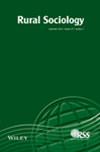Presidential Address: Reconceptualizing Rurality and Nurturing Rural Sociological Souls☆
IF 2.3
3区 社会学
Q2 SOCIOLOGY
引用次数: 0
Abstract
This address focuses on the importance of inclusivity and diversity to the future of the Rural Sociological Society. It begins by sharing the author's experiences within the society as a rural‐focused scholar trained in a Sociology department without strong ties to the RSS, and the challenges she faced in earning recognition in the RSS. It goes on to explore the development of the RSS and the ways in which this history continues to shape who is and isn’t perceived as a rural sociologist. It then argues that the society should strive to be more inclusive in the ways it conceptualizes both rurality and rural sociology. This inclusivity should be extended to those who care about rural places and populations and treat them with respect, regardless of whether they were trained in historic departments of Rural Sociology. The Society should view multidisciplinarity as a benefit, not a detriment to its long‐term health and flourishing. The address ends by calling upon members to engage in the work of nurturing rural sociological souls wherever they are trained and working. It emphasizes the importance of a renewed commitment to diversity and inclusivity in multiple forms.主席致辞:重新认识乡村性,培育乡村社会学灵魂☆。
这篇演讲的重点是包容性和多样性对农村社会学会未来的重要性。文章首先分享了作者作为一名在与 RSS 没有紧密联系的社会学系接受培训的专注于农村问题的学者在该学会中的经历,以及她在获得 RSS 承认时所面临的挑战。文章接着探讨了 RSS 的发展,以及这段历史如何继续影响着人们对农村社会学家的看法。然后,文章认为,社会应努力提高其对农村和农村社会学概念的包容性。这种包容性应扩展到那些关心农村地区和人口并尊重他们的人,无论他们是否在历史悠久的农村社会学系接受过培训。学会应将多学科性视为其长期健康和蓬勃发展的有利因素,而不是不利因素。讲话最后呼吁会员们参与培养农村社会学灵魂的工作,无论他们在哪里接受培训和工作。它强调了以多种形式重新致力于多样性和包容性的重要性。
本文章由计算机程序翻译,如有差异,请以英文原文为准。
求助全文
约1分钟内获得全文
求助全文
来源期刊

RURAL SOCIOLOGY
SOCIOLOGY-
CiteScore
4.60
自引率
13.00%
发文量
47
期刊介绍:
A forum for cutting-edge research, Rural Sociology explores sociological and interdisciplinary approaches to emerging social issues and new approaches to recurring social issues affecting rural people and places. The journal is particularly interested in advancing sociological theory and welcomes the use of a wide range of social science methodologies. Manuscripts that use a sociological perspective to address the effects of local and global systems on rural people and places, rural community revitalization, rural demographic changes, rural poverty, natural resource allocations, the environment, food and agricultural systems, and related topics from all regions of the world are welcome. Rural Sociology also accepts papers that significantly advance the measurement of key sociological concepts or provide well-documented critical analysis of one or more theories as these measures and analyses are related to rural sociology.
 求助内容:
求助内容: 应助结果提醒方式:
应助结果提醒方式:


